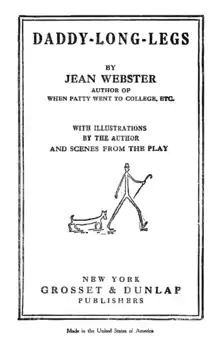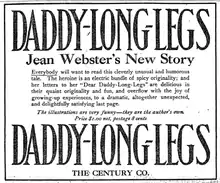Daddy-Long-Legs (novel)
Daddy-Long-Legs is a 1912 epistolary novel by the American writer Jean Webster. It follows the protagonist, Jerusha "Judy" Abbott, as she leaves an orphanage and is sent to college by a benefactor whom she has never seen.
 Title cover | |
| Author | Jean Webster |
|---|---|
| Genre | Young adult |
Publication date | 1912 |
| Followed by | Dear Enemy |
Plot summary
Jerusha Abbott was brought up at the John Grier Home, an old-fashioned orphanage. The children were completely dependent on charity and had to wear other people's cast-off clothes. Jerusha's unusual first name was selected by the matron from a gravestone (she hates it and uses "Judy" instead), while her surname was selected out of the phone book. At the age of 17, she finished her education and is at loose ends, still working in the dormitories at the institution where she was brought up.
One day, after the asylum's trustees have made their monthly visit, Judy is informed by the asylum's dour matron that one of the trustees has offered to pay her way through college. He has spoken to her former teachers and thinks she has potential to become an excellent writer. He will pay her tuition and give her a generous monthly allowance. Judy must write him a monthly letter because he believes that letter-writing is important to the development of a writer. However, she will never know his identity; she must address the letters to Mr. John Smith, and he never will reply.
Judy catches a glimpse of the shadow of her benefactor from the back, and knows he is a tall long-legged man. Because of this, she jokingly calls him Daddy-Long-Legs. She attends a "girls college" on the East Coast. She illustrates her letters with childlike line drawings, also created by Jean Webster.
The book chronicles Judy's educational, personal, and social growth. One of the first things she does at college is to change her name to Judy. She designs a rigorous reading program for herself and struggles to gain the basic cultural knowledge to which she, growing up in the bleak environment of the orphanage, never was exposed.
During her stay, she befriends Sallie McBride (the most entertaining person in the world) and Julia Rutledge Pendleton (the least so) and sups with them and Leonora Fenton.
Dedication
The book is dedicated "To You." Today this book is often classified as children's literature, but at the time it was part of a trend of "girl" or "college girl" books which featured young female protagonists dealing with post-high-school concerns such as college, career, and marriage. These books predated the contemporary view of adolescence. Other authors who wrote in this vein include L. M. Montgomery and Louisa May Alcott. In Georgina Castle Smith's children's novel Nothing to Nobody (1873), Daddy Long Legs (sic) is the name of the orphaned urchin who receives the assistance.[1]

Current reception
Daddy Long Legs still receives good reviews.[2] Reviewers comment on its relatability to a wide variety of audiences and unique nature in comparison to other modern books' – it isn't filled with action or melodrama, but rather just regular life. Reviewers also note that people tend to be attracted to orphans and orphanages, especially now that they have been mythologized in fiction such as Little Orphan Annie. Judy's being an orphan makes her sympathetic and allows for more room for her to learn and grow while in college, reviewers note.[2]
However, Janice Alberghene criticizes Daddy Long Legs for its paternalistic themes,[3] asserting that the novel is considered a "classic" because it revolves around a father figure who offers what Alberghene calls "sugar," or gifts. When Judy, an orphan her whole life just now starting to discover the world, meets her roommate's uncle Jervis (who doesn't yet reveal that he is Daddy Long Legs), she is attracted only by his wealth, and stays with him primarily for the gifts he gives her. Alberghene finds that Judy's vulnerability makes her attraction to a rich man particularly problematic and argues that this message is harmful in modern society, especially for the target audience, young women, implying that the ideal man should have money and that human relationships are transactional.[3]
Stage and screen
This book was Webster's best-known work. Webster herself adapted it into a stage play which debuted in 1914. In addition, it was adapted into a 1952 British stage musical comedy called Love from Judy,[4] as well as films in 1919 (starring Mary Pickford), 1931 (starring Janet Gaynor and Warner Baxter), 1935 (a Shirley Temple adaptation called Curly Top) and a 1955 film, Daddy Long Legs (starring Fred Astaire and Leslie Caron). The latter two film versions departed considerably from the plot of the original novel.[5]
The 1990 TV serial Watashi no Ashinaga Ojisan (My Daddy-Long-Legs) was directed by Kazuyoshi Yokota for the Nippon Animation studio as that year's installment of the studio's World Masterpiece Theater.
In India, the novel was adapted into a Malayalam movie, Kanamarayathu in 1984. Anokha Rishta, a Hindi remake by the same director was released in 1986.
The 2005 Korean movie Kidari Ajeossi has elements of Daddy-Long-Legs transferred into a modern setting.
In 2009, the novel was made into a two-person musical play by John Caird (book) and Paul Gordon (music), which premiered at the Rubicon Theatre Company (Ventura, California) and TheatreWorks (Palo Alto, California).[6] On September 27, 2015, the musical premiered Off-Broadway at the Davenport Theatre with Megan McGinnis and Paul Alexander Nolan.
References
- "Smith, Georgina Castle [née Georgina Meyrick; pseud. Brenda]". Oxford Dictionary of National Biography (online ed.). Oxford University Press. doi:10.1093/ref:odnb/41041. (Subscription or UK public library membership required.)
- Martin, Ann. "An Introduction to 'Daddy-Long-Legs'". www.publishersweekly.com. Retrieved 2019-09-24.
- Alberghene, Janice (Summer 1987). "Daddies' Girls". Children's Literature Association Quarterly. 12: 75–78.
- Keely, Karen (September 2004). "Teaching Eugenics to Children: Heredity and Reform in Jean Webster's Daddy-Long-Legs and Dear Enemy". The Lion and the Unicorn. 28 (3): 363–389. doi:10.1353/uni.2004.0032.
- Phillips, Anne K (1999), ""Yours most loquaciously": Voice in Jean Webster's Daddy-Long-Legs", Children's Literature, 27: 64–85, doi:10.1353/chl.0.0124
- TheatreWorks program, January 2010
External links
| Wikisource has original text related to this article: |
 Media related to Daddy-Long-Legs (novel) at Wikimedia Commons
Media related to Daddy-Long-Legs (novel) at Wikimedia Commons- Daddy-Long-Legs at Project Gutenberg
 Daddy-Long-Legs public domain audiobook at LibriVox
Daddy-Long-Legs public domain audiobook at LibriVox